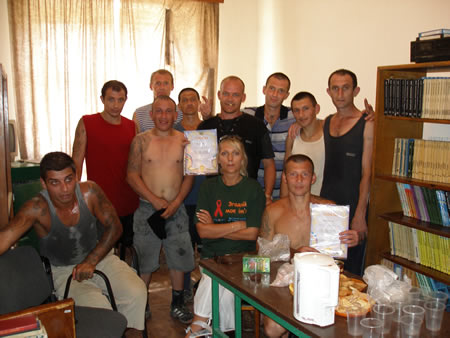GMT Grantee Profile
The Penitentiary Initiative (Nikolaev, Ukraine)
Reaching MSM in prisons
Download PDF version of this article
Strategies
- Doing population-specific (prison) prevention outreach
- Forming alliances to overcome barriers and gain trust
The Penitentiary Initiative has been working in Ukrainian prisons since 2001, providing HIV prevention information to prison staff and inmates. The organization also provides HIV treatment, care, and support to HIV-positive inmates, including injection drug users, who constitute the majority of Ukraine’s HIV-positive population.

A support group for MSM prisoners (Photo: The Penitentiary Initiative)
As the Penitentiary Initiative expanded its activities, staff recognized that their HIV work was not reaching vulnerable MSM. In a country where homosexual activity was illegal until 1991, homophobia remains a strong force in Ukraine.1 Data on HIV among MSM are limited, but prevalence is estimated to be around 14 percent.2 However, life behind bars can be uniquely isolating for MSM, who face chilling levels of discrimination from prison staff and other inmates. According to the hierarchy of prison subcultures in Ukraine, MSM are regarded as “outcasts.” Olena Chupryna, project coordinator and executive director of the Penitentiary Initiative, explains that because MSM hold such low status, they “are forced to do all the dirty jobs in the prison.” The men, she says, “usually have lost their social connections. Many of them do not have visitors, they usually have low levels of education, and it’s not easy to reach them.”
In order to engage this stigmatized population, the Penitentiary Initiative formed a partnership in 2008 with LiGA, the Nikolaev Association for Gays, Lesbians and Bisexuals, which contributed funding for an initial pilot project and trained Penitentiary Initiative staff in the specific needs of MSM. The Initiative staff then developed an outreach model of HIV prevention and psychosocial support that they implemented in four prisons in the Nikolaev, Lugansk, and Cherkassy regions of Ukraine.
In less than three years, this project has made significant headway in breaking down the barriers to HIV education and social support among MSM in Ukrainian prisons. To change the culture of prison attitudes toward MSM and open the door for HIV prevention efforts, the Penitentiary Initiative has employed multiple strategies, among them training prison staff, supplying HIV prevention kits to MSM, organizing support groups, and providing access to social and mental health counseling.
Initially the MSM project’s primary challenge was to develop trust between counselors and prisoners. Another major difficulty was pervasive stigma. In virulently homophobic prison environments, few men were willing to join MSM peer group discussions, much less gather to discuss HIV. To broker trust between inmates and Penitentiary Initiative counselors, the organization allied with individuals who were already connected with the inmates. At one site, the head of the medical unit helped the organization link up with MSM inmates; at another, the head of psychological services invited outcast inmates to his office to meet project psychologists and explain plans for MSM/HIV support groups.
Now well established in an expanding number of prisons, the MSM/HIV program provides regular psychosocial support for inmates along with trainings about HIV prevention, including safer sex. Condoms and lubricant are distributed as well as personal hygiene supplies and supplementary food rations. Soap, rubber gloves, and other protective supplies are given to men forced to do the prison’s dirtiest jobs. The project also assists inmates once they have been released from prison by linking them to social support and outreach programming offered by LiGA, and refers them to MSM-friendly health services.
The early success of the Penitentiary Initiative’s MSM/HIV program has encouraged it to develop MSM/HIV materials that could be offered as a standard package of HIV services in other Ukrainian prisons. These guidelines will be submitted for review by the country’s department of prisons with a view toward national adoption. According to program staff, one of the most important results of their project is the attention it has drawn to MSM and HIV within the prison system—an issue that had previously been overlooked by national authorities.
Ms. Chupryna relays two recent stories from the prisons where they work: “According to prison culture, outcasts are not allowed to participate in general mass actions and events. But due to the MSM support groups and our work with the general prison population and staff, now the outcasts are allowed to participate in events. Last year, there was a football tournament for the MSM group [at one prison] that would have been impossible a year ago. In [another prison], one of the MSM group members now participates in prison theater, which would previously have been absolutely unthinkable. And now he writes plays for the theater and performs on the stage. Most important, the level of knowledge about HIV prevention and sexual health has increased significantly—knowledge that MSM inmates will carry with them when they re-enter society.”
Footnotes
1. Ottosson D. State-sponsored Homophobia: A World Survey of Laws Prohibiting Same Sex Activity Between Consenting Adults. 2010. The International Lesbian, Gay, Bisexual, Trans and Intersex Association.
2. UNAIDS/WHO. Epidemiological Fact Sheets on HIV and AIDS, Ukraine, 2008 Update. Accessed on May 4, 2010.
Related stories
Red Ribbon Awards Go to MSM Grantees